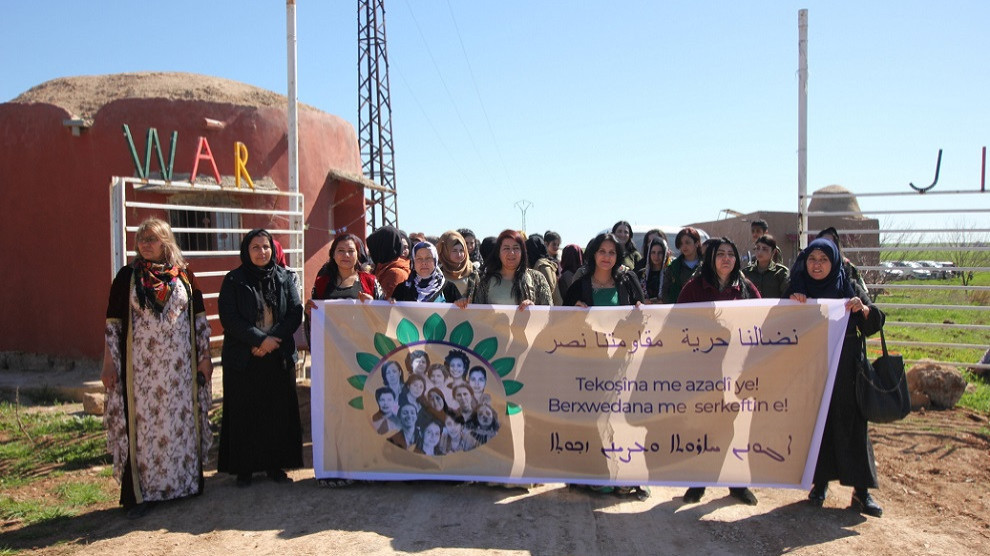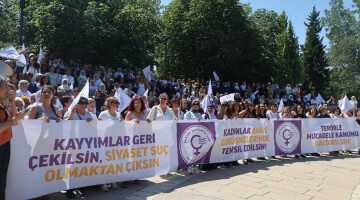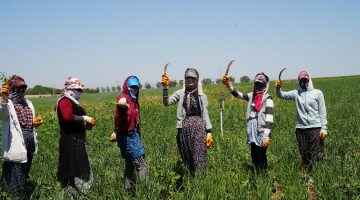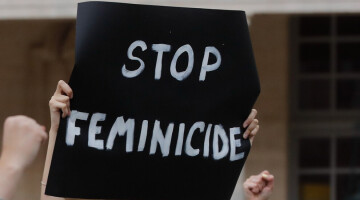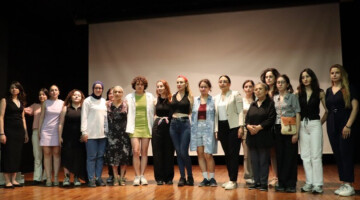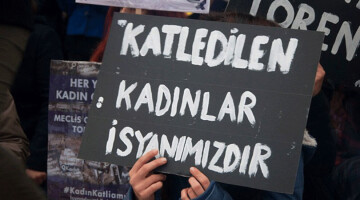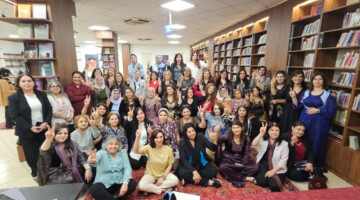The residents of Jinwar in Rojava made a statement on the occasion of the Women's Day of Struggle on March 8. The women's village is located in the west of Dirbêsiyê in the canton of Hesekê. It was opened on 25 November 2018. Women of different origins live in the village. Besides Yazidi, Christian, Muslim, Kurdish, Syriac and Arab women, women from all over the world take part in the alternative life in the village.
The statement from Jinwar is introduced with a poem by an unknown Vietnamese revolutionary:
"We fill the craters of the bombs
and sow again
and sing again
because life never surrenders"
Jinwar had to be temporarily evacuated for security reasons at the beginning of the Turkish invasion of northern Syria in October last year. In the meantime, the women have returned to the village and continue their collective life there. The statement of Jinwar women reads as follows:
“Today is March 8.
On this day we give meaning to the struggle that we as women have fought for thousands of years.
On this day we look at the struggles ahead and remember those women, friends, sisters, mothers who fought resolutely and courageously for our freedom, for our future and gave their lives in this struggle.
We look at today and what we see is that in all places of the world women are rising up because we see, because we hear, because we feel that a life in freedom and peace for us as women has absolutely nothing to do with the politics of exploitation, war, violence and destruction. On the contrary.
Here in the Middle East, in Kurdistan, we are confronted with the most brutal forms of oppression. Be it through the fascism of Turkey, its allied states and jihadist groups. In other places in the world where women are fighting, there are other states and other groups with different names, but all with the same hostile attitude towards women.
Women in all places, of all faiths, of all ages are rising up because we see that nowadays it is not enough to rule over women, to oppress them and consider them worthless, but by our very existence as women, by the mere fact that we women are a danger that is being fought.
It is even the case today that we are forbidden to fight.
That's why our friends in Mexico, the Zapatista women who fight for their country and who have been in the resistance for almost 30 years, say this year on March 8th:
We're not asking for permission to fight.
Like them and many others, we know what we want and what we are fighting for. In an environment of chaos and destruction and violence we put life in the center.
We as women are fighting for the ability to sow. We fight so that the earth that feeds us will feed our children and our children's children. We fight for the air to breathe and clean water to drink.
We fight to protect the childhood of our children so that they can discover the wonders of life little by little. That they can be loved and that they can love themselves.
We fight for our values to be the heritage for our children.
We defend the language with which our mother greeted us when we took our first breath, because it is not only the sound of our mother, but the sound of our history.
We fight to look at our bodies with respect.
And we fight for our dignity.
The most important thing of this day is that we get closer to each other and to perceive ourselves and our struggles.
We fight as women for something essential in the world: that we can come together as women, because we want to know ourselves and our stories, because we value and respect each other, and because our being together enriches our lives.
In Jinwar, the village of free women, we have created a place where this is possible with the strength, effort and creativity of many women. Here we live and work together as women, get to know each other and our stories, share our knowledge, develop friendships. The most important and valuable thing is that we all have different backgrounds. We come from different regions, cultures and stories, our languages and beliefs are different. But what unites us are the attacks against us as women and against our lives. Our desire for a life in freedom and peace and our struggle to realize this desire.
Freedom means for us to shape all areas of our lives with our view as women and through our daily work and to take responsibility for each other and for our children. Here we have the power to create an alternative, which makes it possible to develop our own culture, to live freely according to our own values, together, with our own will, our own hands, our creativity.
Our struggle is freedom.
Our resistance is success.
And we look to the future on this day.
All over the world, more and more women are standing up and resisting.
We want to combine this strength and energy.
We have learned from our shared history that our unity and our organization is our strength. Only together we can be successful, we can fight our common enemy, the system of oppression and overcome the male mentality.
We want to get closer, get to know our stories, develop common values and perspectives and a culture of women's politics.
We call upon all women of the world to develop on this strong basis, through a common struggle towards a world confederalism of women.
As free women we share the call of Serad Mustafa, the mother of Hevrîn Xelef:
"Hevrîn's voice became the voice of the world and of humanity. She became the symbol for the freedom of women. she became a value for the liberation of women. "
"This enemy knows no humanity. There are millions of Hevrîns today. They rose up against fascism and still do. My call to all the women in the world is this: Unite. Raise your voices against Erdogan and against all who support him. And say: ' We are all Hevrîn. We will resist against you. We are Arîn Mîrkan on the Miştenûr hill.' "
JIN, JIYAN, AZADÎ
RELATED NEWS:

